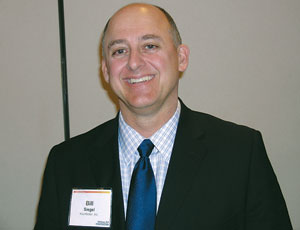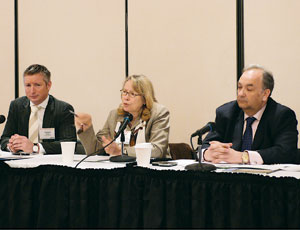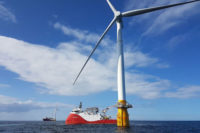Adjust to new realities, give employees a cause to fight for and focus on opportunities: Executives of three design and construction firms offered those strategies as ways for the industry to cope with the current financial crisis. The executives joined other leaders from industry, government and Wall Street at an ENR/McGraw-Hill Construction conference in New York City last month to analyze economic developments and optimize solutions. Ira Levy, president of AECOM’s DMJM Harris unit in New York City, acknowledged that his firm’s revenue will shrink, but he said profitability could still survive. He noted, “A better question to ask is, When the economy comes back, will your company be on top?” Levy urged other managers to create a vision for the future and to be prepared to “capture the upswing.”


But the industry must first weather the current storm as sources of private-sector project finance evaporate or remain sluggish at best. Levy said the new stimulus package has no “process to get the cash out.” Among the new realities is that “government may be our client more than ever,” projects will drag out, cash flow will deteriorate, and litigation will swell, he said.
“It is not a pretty picture, but in many sectors it is not as bad as everyone thinks,” said Stuart Murray, director of infrastructure and energy finance at Citigroup, New York City. He acknowledged the depressed equity finance market but said investors are “piling money” into investment-grade bonds. Murray emphasized, however, that as the cost of capital rises, banks “are looking for the most solid credit and tightest risk and are focusing on core relationships.” He noted that overseas lenders that had been financing U.S. projects “are returning to their home countries” and that EPC contracts would be “highly valued more than ever.”
Michael Kappaz, CEO of project developer K&M Group of Cos., Arlington, Va., added, “We must collectively make sense of the crisis and structure projects that make sense.”
The crisis could affect the progress of planned nuclear powerplants, but proponents say perceived demand will keep the market in gear and safety issues are less of an obstacle. For nuclear power to make up 30% of U.S. power by 2035, “that’s 95 new plants,” noted Bob Percopo, executive vice president of AIG Global Marine & Energy, New York City.
In the transportation market, Cheryl Jones, U.S. Transportation Dept. senior project finance adviser in its TIFIA innovative-finance program, emphasized that the current stimulus package is “not the entire solution.” She said tight credit has boosted interest in TIFIA “to an all-time high.” There is “a lot of interest in seeing how the government can supplement capital markets,” added Pamela Bailey-Campbell, senior vice president at Parsons Brinckerhoff, New York City. She said TIFIA has “more powerful leverage than banks” for transportation projects.
Panelists hedged on predicting when the economy would finally rally, but Charlie Bacon, CEO of Limbach Facility Services, Pittsburgh, noted the importance of keeping employees focused and motivated. Limbach, once owned by Enron, endured the crisis of the parent’s demise in 2000 and saved its market share by rallying demoralized staffers around the cause of safety, said Bacon. “At Limbach, people believed safety saved the company,” he told attendees. “We have a lot of young people and college graduates, and they expect us to save the planet.”
Motivating employees whose company stock holdings recently have plummeted in value is a growing challenge for CEOs, noted Bill Siegel, who will take on that job next month at San Diego-based Kleinfelder Inc. But he told conference attendees: “Don’t forget the future. We still have a $14-trillion economy, and things do turn around...so outcompete the competition, and keep an eye on the future.” Siegel added, “When times are tough, great teams steal market share.”






Post a comment to this article
Report Abusive Comment